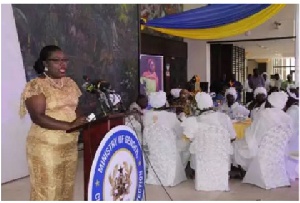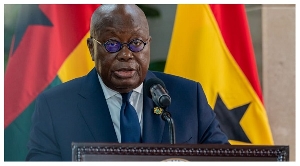Regional News of Monday, 17 October 2016
Source: GNA
Traditional priests must talk against early marriage - Minister
Nana Oye-Lithur, Minister of Gender, Children and Social Protection has appealed to fetish priests and priestess to use their influence as spiritual leaders to advocate against child marriage.
Nana Oye Lithur said tradition and culture had been identified as one of the major drivers of child marriage because of some beliefs and practices that condoned child marriage.
She expressed worry that most incidents of child marriage resulted in the termination or delay of education especially for girls, verbal and physical abuse, health complications, and poverty.
The Minister said this in Accra at an engagement with Ga Fetish Priests and Priestesses on ending child marriage in the country.
The engagement provided opportunity to discuss and assess customs and traditions which condoned child marriage and how to eliminate them.
“As custodians of the highest power of the Ga land, you have the opportunity to protect the welfare of all your people, especially girls who are the major victims to child marriage,” she added.
She said the engagement was critical because the priests and priestesses play an important roles in the communities and were great influence in ending child marriage.
Nana Oye Lithur said it was estimated that one third of girls in developing countries were married before the age of 18 and some before 15 years.
The national prevalence of child marriage in the country has not declined since 2011, remaining stable at 21 per cent as at 2014. For girls living in the Northern, Upper East and Upper West Regions this percentage had increased to 34 per cent.
The Minister explained that child marriage increased illiteracy especially among girls who fell victim to poverty, limited human resource, and health risks resulting in serious implications for the growth and development of the country.
“To address the issue of child marriage in Ghana, the Ministry of Gender, Children and Social Protection under our Domestic Violence Secretariat set up the Ending Child Marriage Coordinating Unit in 2014”.
She said with support from UNICEF the Ministry had developed a national strategic framework on ending child marriage in the country, conducted a number of sensitisation and awareness programmes to bring on board stakeholders to join the campaign to end child marriage.
Nana Oye-Lithur observed that, some traditions and religions promoted child marriage under the disguise of safeguarding the child against immoral behaviour and avoiding disgrace from teenage pregnancy.
She said another cause of child marriage which was high among traditional households was teenage pregnancy where research showed that Accra recorded more than 10,000 teenage pregnancies.
The fetish priests and priestesses pledged their resolute commitment to speak out against child marriage in the communities to protect their human rights.











